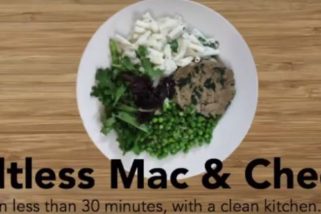Adam Schmidt shows you how you can make this healthy meal in under 30 minutes with a spotless kitchen.
Meal includes: Turkey Patties with onions, peas and a green salad.
You can get the full recipe book and quinoa pasta on megawayshakes.com
1. Quinoa is one of the most protein-rich foods you can eat. It is a “complete protein” which contains all nine essential amino acids.
2. Quinoa contains almost 2x as much fiber as most other grains. Fiber helps if you are constipated and also helps to prevent heart disease by reducing high blood pressure and diabetes. Fiber lowers cholesterol and glucose levels, and may lower your risk of developing hemorrhoids and may help you to lose weight as it takes a longer time to chew than does other foods because it makes you feel fuller for longer and is less “energy dense” which means it has fewer calories for the same volume of food.
3. Quinoa contains Iron. Iron helps keep our red blood cells healthy and is the basis of hemoglobin formation. Iron carries oxygen from one cell to another and supplies oxygen to our muscles to aid in their contraction. Iron increases brain function because the brain takes in about 20% of our blood oxygen. There are many benefits of iron some more of which include neurotransmitter synthesis, regulation of body temperature, aids enzyme activity and energy metabolism.
4. Quinoa contains lysine. Lysine is essential for tissue growth and repair.
5. Quinoa is rich in magnesium. Magnesium helps to relax blood vessels and thereby to alleviate migraines. Magnesium also may reduce Type 2 diabetes by promoting healthy blood sugar control. Other health benefits include transmission of nerve impulses, body temperature regulation, detox, energy production, and the formation of healthy bones and teeth.
6. Quinoa is high in Riboflavin (B2). B2 improves energy metabolism within the brain and muscle cells and is known to help create proper energy production in cells.
7. Quinoa has a high content of manganese. Manganese is an antioxidant, which helps to prevent damage of mitochondria during energy production as well it protects red blood cells and other cells from injury by free radicals.




